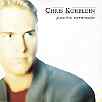Chris Korblein: Those are obviously two different things. I wanted to be a guitar player to meet girls, and be a rock star as my career goal. It's pathetic, but isn't that why most kids are starting to pick up the guitar? My musical influences...hmm...it was always
about feelings. That's how it always was. If a musical piece touched me or I could see how it touches other people I would consider it "real music". It always was my goal to be a "real musician" in the sense that I am touching people with my work.
Chris Korblein: I am playing a Custom made RIST Guitar, built for me by Roman Rist, a big time luthier in Hollywood. It has huge frets, a maple neck and a swamp-ash body. I am using ELIXIR strings exclusively and EMG pickups. The Roland Corporation was nice enough to provide me with a Roland Blues Cube amp which I have used on my CD. It sounds spectacular. After going through the refrigerator-sized MIDI rack nightmare of the eighties, I am exclusively using combo amps for my studio work. I have combos
from Fender, Roland and Rivera.
Chris Korblein: As I described earlier, I want to bring across the essence of what I like in other people's music and touch people. Lately, I have stopped using a pick, which has
changed my tone and playing technique radically.
Chris Korblein: Right now I am scoring for various TV projects including a documentation on lifeguards. It's a great experience to put aside your normal artistic approach and just try to touch people by making the pictures more intense.
Chris Korblein: If there's nine songs on a CD, there were nine different approaches to writing them. When it happens, it happens. Whether it's in the shower, in the car or while I'm asleep. All I need is Cubase VST (sequencing software) to put the idea straight to hard disk. When I'm out, a cellular phone and an answering machine will do.

Chris Korblein: I record at home with VST and then take files to the studio to complete the sessions.
Chris Korblein: For Europe my music is not aggressive enough and in the US I didn't have anybody to present it to. So rather than making so-called industry contacts and "wait until it happens" I decided to do it myself, which turned out to be much faster and got me and my music much more respect. I highly recommend a musical statement such as this to all musicians who intend to be a part of this complex industry.